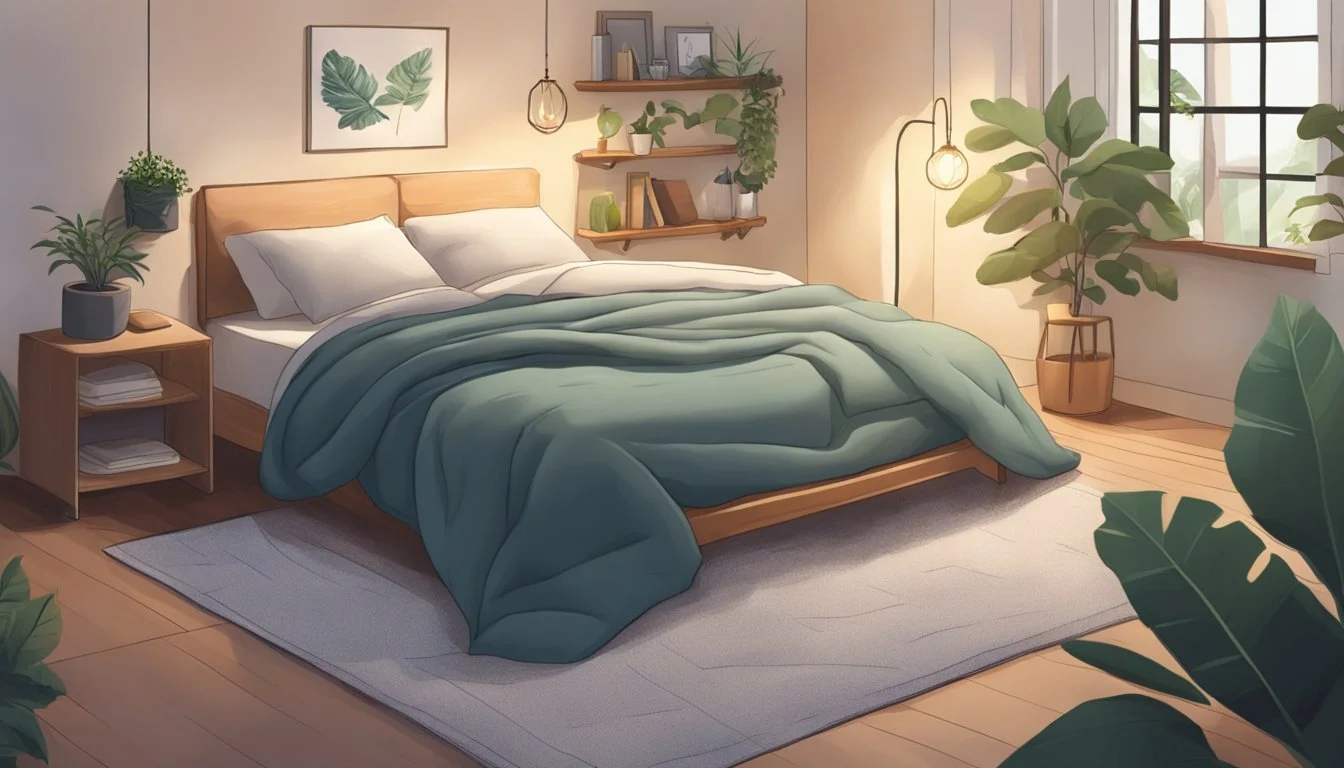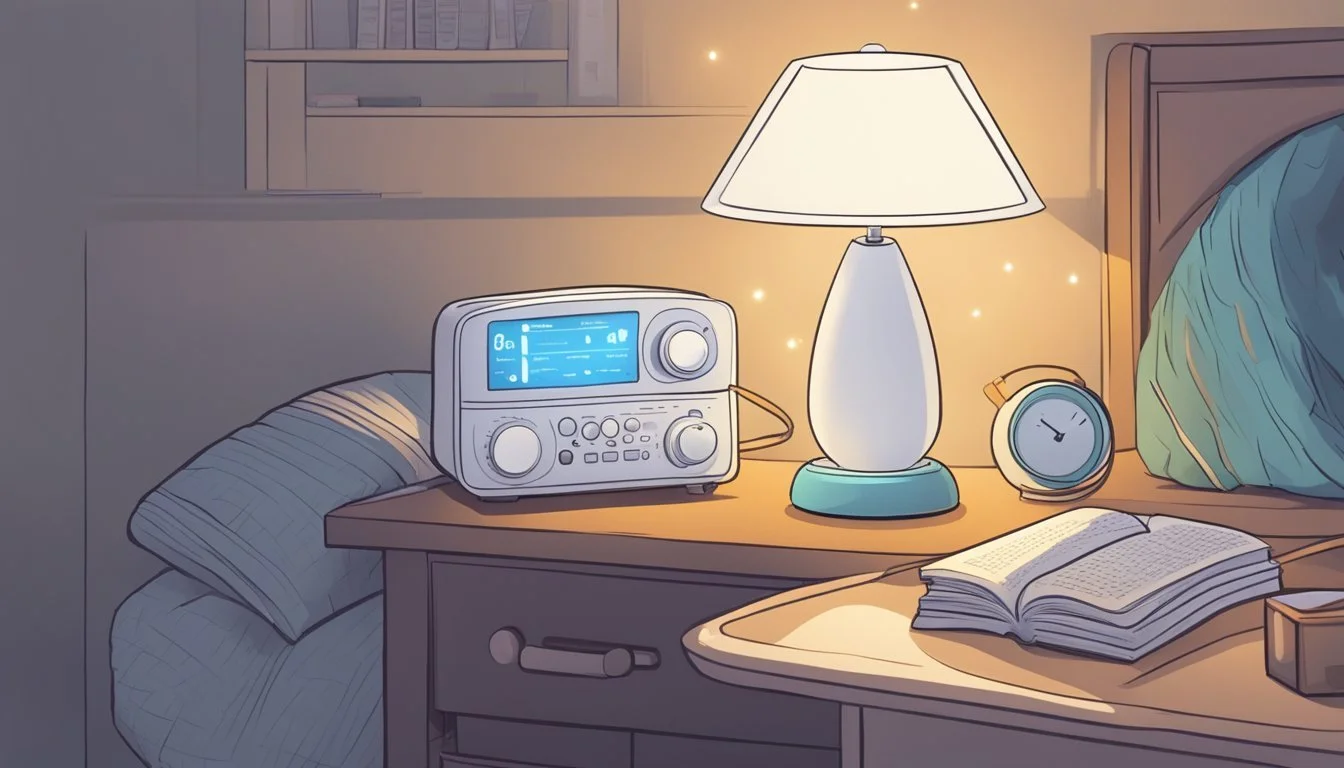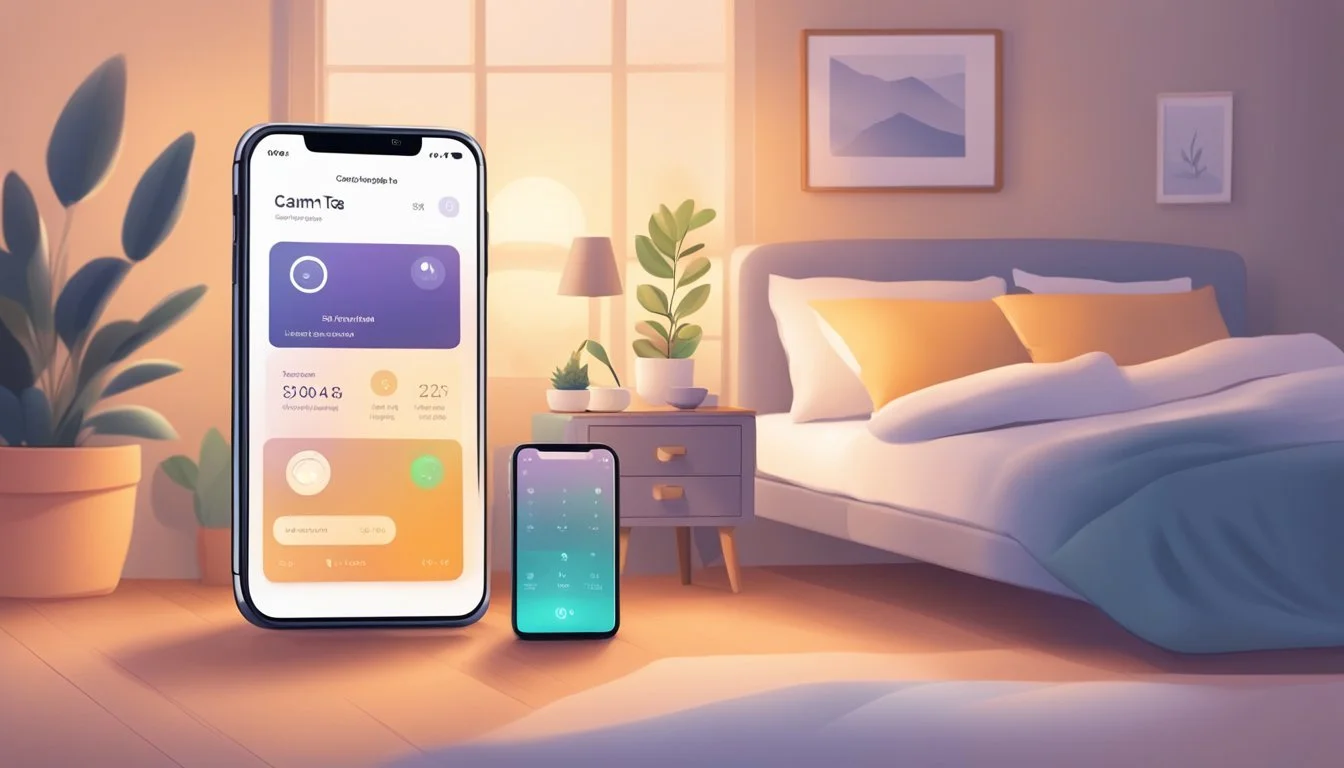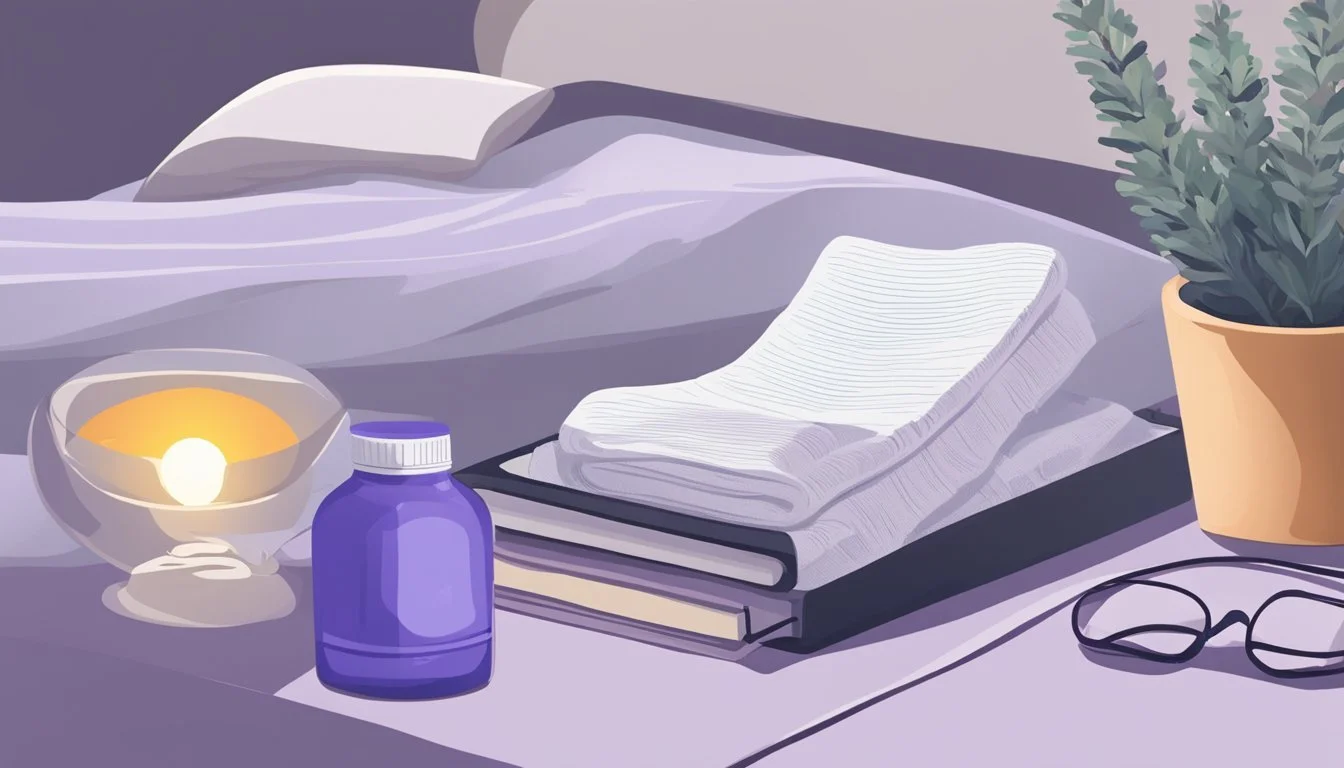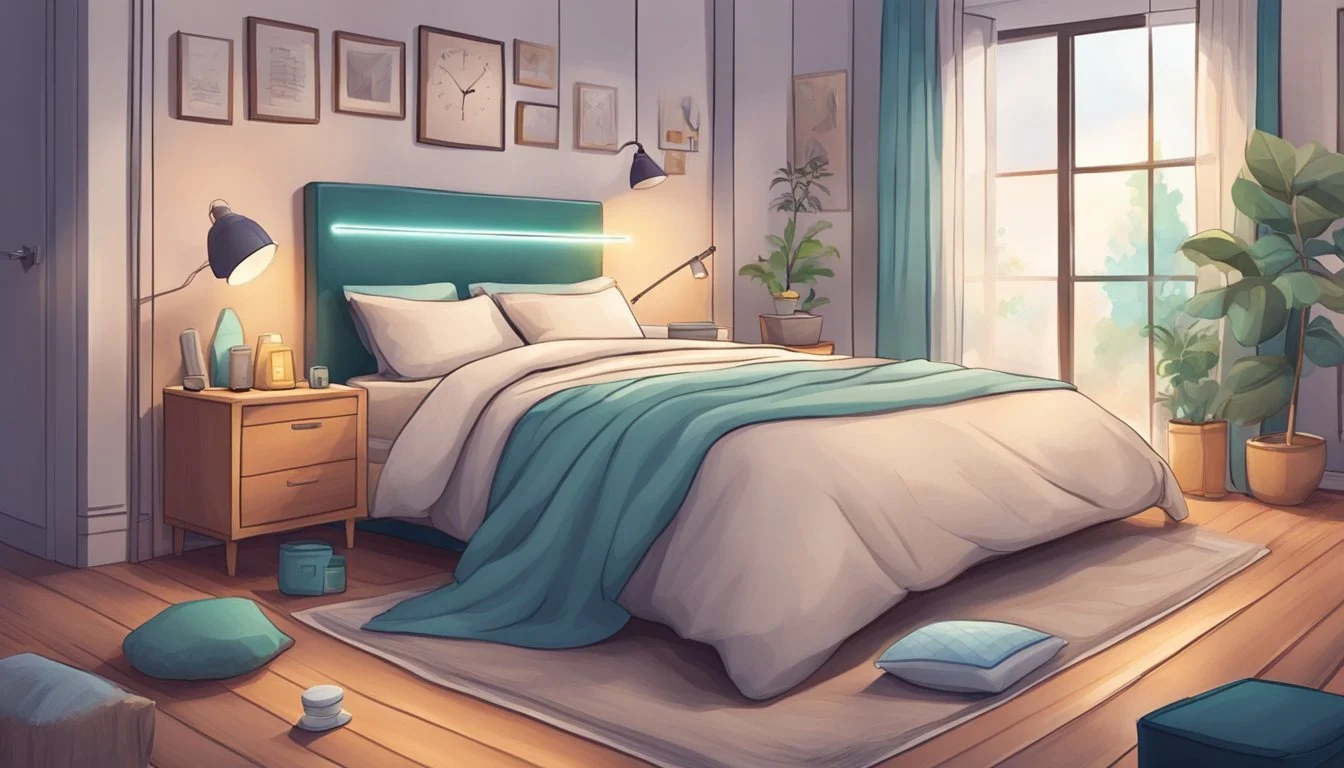9 Unusual Sleep Hacks for Better Mental Recovery
Unconventional Techniques to Boost Cognitive Restoration
Sleep plays a crucial role in mental recovery and overall well-being. While many people are familiar with common sleep advice, there are lesser-known techniques that can significantly improve sleep quality and cognitive function.
This article explores nine unconventional sleep hacks backed by scientific research and expert insights. These unusual methods offer innovative approaches to enhance sleep patterns and promote better mental recovery, potentially leading to improved focus, mood, and productivity during waking hours.
1) Weighted Blanket
Weighted blankets have gained popularity as a sleep aid in recent years. These specially designed blankets typically weigh between 5 to 30 pounds and are filled with materials like glass beads or plastic pellets.
The principle behind weighted blankets is deep pressure stimulation. This gentle, distributed pressure on the body can help relax the nervous system and promote a sense of calm.
Research suggests weighted blankets may benefit those with anxiety, insomnia, and other sleep disorders. A 2015 study found that using a weighted blanket increased sleep time and decreased nighttime movements in participants with insomnia.
Weighted blankets are also used in some medical settings. Hospitals have employed them to help calm patients before procedures or to improve sleep quality during stays.
When choosing a weighted blanket, experts recommend selecting one that's about 10% of your body weight. It's important to ensure the weight is comfortable and doesn't restrict breathing or movement.
While not a cure-all, many users report feeling more relaxed and experiencing improved sleep quality with weighted blankets. As with any sleep aid, individual results may vary.
2) White Noise Machine
White noise machines have gained popularity as effective sleep aids. These devices emit consistent background sounds that mask disruptive noises and create a soothing environment for sleep.
Many white noise machines offer a variety of sound options beyond traditional white noise. These can include nature sounds, fan noises, and ambient tones. Users can choose the sound that works best for their sleep needs.
Some advanced models feature non-repeating sound patterns to prevent the brain from becoming accustomed to repetitive noise. This can enhance the machine's effectiveness in promoting uninterrupted sleep.
Portable white noise machines are available for travelers who want to maintain their sleep routine away from home. These compact devices often have rechargeable batteries and can run for extended periods.
White noise machines may be particularly beneficial for light sleepers or those living in noisy environments. By creating a consistent audio backdrop, they can help reduce sleep disturbances caused by external sounds.
When selecting a white noise machine, factors to consider include sound quality, volume control, timer functions, and power options. Some models also offer smartphone app integration for added convenience.
3) Aromatherapy Diffusers
Aromatherapy diffusers have gained popularity as a natural sleep aid. These devices disperse essential oils into the air, creating a soothing atmosphere conducive to rest.
Many essential oils are known for their sleep-promoting properties. Lavender, cedarwood, and vetiver are commonly used to induce relaxation and improve sleep quality.
Diffusers come in various types, including ultrasonic and nebulizing models. Ultrasonic diffusers use water to disperse oils, while nebulizing diffusers release a more concentrated mist of pure essential oils.
To use a diffuser for better sleep, it's best to start it about 30 minutes before bedtime. This allows the scent to permeate the room before settling in for the night.
Experimenting with different oil blends can help find the most effective combination for individual sleep needs. Some people prefer single oils, while others enjoy more complex blends.
It's important to use high-quality, pure essential oils in diffusers. Lower quality oils may contain synthetic additives that could potentially irritate the respiratory system.
Consistent use of aromatherapy diffusers as part of a bedtime routine can signal to the body that it's time to wind down, potentially leading to improved sleep patterns over time.
4) Sleep Stories (Calm App)
Sleep Stories on the Calm app offer a unique approach to improving sleep quality. These narrated tales are specifically designed to help listeners drift off into a peaceful slumber.
The app features a diverse collection of over 250 Sleep Stories, covering a wide range of topics. From soothing nature descriptions to fantasy adventures, there's something for everyone.
Professional voice actors and celebrities lend their voices to these stories, creating a calming atmosphere. The gentle narration and ambient sounds work together to lull users to sleep.
Sleep Stories help users transition from the busy world to a state of relaxation. They provide a mental distraction from daily stressors and racing thoughts that often interfere with falling asleep.
The Calm app also includes a nap category for those seeking a quick rest during the day. This feature caters to different sleep needs and schedules.
By incorporating Sleep Stories into their nightly routine, many users report improved sleep quality and reduced anxiety. This innovative sleep aid combines storytelling with relaxation techniques for better mental recovery.
5) Blue Light Blocking Glasses
Blue light blocking glasses have gained popularity as a tool for improving sleep quality. These specialized glasses filter out blue light emitted by electronic devices and artificial lighting.
Blue light exposure in the evening can disrupt the body's natural circadian rhythm. It suppresses melatonin production, making it harder to fall asleep and achieve restful slumber.
Wearing blue light blocking glasses after sunset may help mitigate these effects. They create an artificial sunset for the eyes, signaling to the body that it's time to wind down.
Users report various benefits from wearing these glasses in the evening hours. Some experience increased daytime energy, deeper sleep, and enhanced mental clarity.
Several styles and brands of blue light blocking glasses are available on the market. Prices range from budget-friendly options to higher-end designer frames.
When choosing blue light blocking glasses, consider factors like the percentage of blue light blocked and overall comfort. Some glasses block up to 70% of blue light, while others claim to filter out nearly all of it.
For optimal results, experts recommend putting on blue light blocking glasses 2-3 hours before bedtime. This allows the body to naturally prepare for sleep without artificial light interference.
6) Magnesium Supplements
Magnesium supplements have gained attention as a potential sleep aid and mental recovery booster. This mineral plays a crucial role in various bodily functions, including sleep regulation and cognitive processes.
Studies suggest that magnesium deficiency is common, affecting up to 50% of the U.S. population. Supplementation may help address this issue and improve sleep quality.
Certain forms of magnesium are particularly effective for sleep enhancement. Magnesium threonate and magnesium bisglycinate have shown promise in increasing sleep depth and reducing the time it takes to fall asleep.
These supplements may also support cognitive function and muscle recovery. Magnesium is involved in neurotransmitter regulation and muscle relaxation, potentially contributing to better mental and physical recovery during sleep.
When considering magnesium supplementation, it's important to choose high-quality, bioavailable forms. Magnesium malate and glycinate are well-absorbed options that are less likely to cause gastrointestinal discomfort.
As with any supplement, individuals should consult with a healthcare professional before adding magnesium to their sleep routine. Proper dosage and timing can help maximize the benefits of this mineral for sleep and mental recovery.
7) Progressive Muscle Relaxation
Progressive Muscle Relaxation (PMR) is a powerful technique for improving sleep quality and reducing stress. This method involves systematically tensing and relaxing different muscle groups throughout the body.
To practice PMR, start by lying comfortably in bed. Begin with your toes, tensing them for a few seconds before releasing. Gradually work your way up through each muscle group, including feet, legs, buttocks, stomach, chest, arms, and face.
PMR can help lower blood pressure and promote cardiovascular health. It's particularly effective for those who struggle with falling asleep due to racing thoughts or anxiety.
For best results, incorporate PMR into your nightly routine. Aim to tense and relax at least 16 muscle groups, moving from toes to forehead. This practice can significantly improve sleep onset and overall sleep quality.
Many find PMR helpful for managing insomnia and reducing nighttime stress. It's a simple yet effective tool that requires no special equipment, making it accessible to anyone seeking better sleep and mental recovery.
8) Chamomile Tea
Chamomile tea is a popular herbal remedy known for its sleep-promoting properties. This caffeine-free beverage contains compounds that can help induce relaxation and improve sleep quality.
Research suggests that chamomile tea may increase glycine levels in the body, a neurotransmitter that can have mild sedative effects. This can help people fall asleep faster and experience more restful sleep throughout the night.
Regular consumption of chamomile tea before bedtime may also reduce symptoms of anxiety and stress. By calming the nervous system, it can create a more conducive environment for sleep.
Some studies indicate that chamomile tea may enhance REM sleep, which is crucial for cognitive function and emotional regulation. This can lead to improved mental clarity and mood upon waking.
Chamomile tea is generally considered safe for most people. However, individuals with allergies to plants in the daisy family should exercise caution. It's always advisable to consult a healthcare professional before incorporating new sleep aids into one's routine.
9) Cool Bedroom Temperature
Maintaining a cool bedroom temperature can significantly improve sleep quality and mental recovery. The ideal sleep environment is typically between 60-67°F (15-19°C).
This temperature range helps facilitate the natural drop in body temperature that occurs during sleep. A cooler room makes it easier for the body to reach and maintain this lower temperature throughout the night.
Several strategies can help achieve and maintain a cool bedroom. Using air conditioning or fans can effectively lower room temperature. Opening windows at night in cooler climates can also bring in fresh, cool air.
Choosing breathable bedding materials like cotton or bamboo can prevent overheating during sleep. Lightweight pajamas or sleeping with minimal clothing can also help regulate body temperature.
For those who prefer a warmer room, using a cooling mattress pad or pillow can create a more comfortable microclimate without adjusting the entire room's temperature. These products can provide localized cooling effects.
Experimenting with different temperatures within the recommended range can help individuals find their optimal sleep environment. Some people may prefer slightly cooler or warmer temperatures based on personal comfort and physiology.
The Science Behind Sleep and Mental Recovery
Sleep plays a crucial role in mental recovery and brain function. Quality sleep regulates cognitive processes and emotional well-being, impacting overall mental health.
How Sleep Regulates Brain Function
Sleep facilitates the clearance of metabolic waste from the brain. During sleep, the glymphatic system becomes more active, flushing out toxins that accumulate during wakefulness. This process is essential for maintaining cognitive function and preventing neurodegenerative disorders.
Sleep also consolidates memories. The brain replays and strengthens neural connections associated with important experiences, enhancing learning and problem-solving abilities.
Adequate sleep improves attention, decision-making, and creativity. It allows the prefrontal cortex, responsible for executive functions, to rest and recharge.
The Link Between REM Sleep and Emotional Health
REM (Rapid Eye Movement) sleep is particularly important for emotional regulation. During REM sleep, the brain processes and integrates emotional experiences, helping to reduce the intensity of negative emotions.
This stage of sleep is associated with increased activity in the amygdala and hippocampus, regions crucial for emotional memory processing. REM sleep helps the brain contextualize emotional events, potentially aiding in recovery from trauma.
Studies show that REM sleep deprivation can lead to increased irritability, anxiety, and difficulty regulating emotions. Consistent, high-quality REM sleep is linked to better mood stability and emotional resilience.
Understanding Sleep Cycles
Sleep cycles consist of distinct stages that our brains move through during the night. These cycles play a crucial role in mental recovery and overall health. Proper sleep architecture allows the body and mind to repair, consolidate memories, and prepare for the next day.
Stages of Sleep
Sleep cycles typically last 90-120 minutes and repeat 4-6 times per night. The first stage is light sleep, where brain waves slow and muscles relax. Next comes deeper slow-wave sleep, characterized by delta waves.
REM (rapid eye movement) sleep follows, marked by increased brain activity and vivid dreams. During REM, the body becomes temporarily paralyzed to prevent acting out dreams.
Non-REM stages make up about 75-80% of total sleep time in adults. REM periods get longer as the night progresses, with the final cycle containing the most REM sleep.
The Importance of Deep Sleep
Deep slow-wave sleep is critical for physical restoration and mental recovery. Growth hormone is released, muscles repair, and the immune system strengthens during this stage.
Deep sleep also allows the brain to clear out toxins and consolidate memories. Studies show it improves cognitive performance, creativity, and emotional regulation the next day.
Consistently getting enough deep sleep may reduce the risk of Alzheimer's disease and other cognitive decline. Most deep sleep occurs in the first half of the night, so prioritizing early bedtimes can increase time spent in this restorative stage.
Lifestyle Factors Affecting Sleep Quality
Diet and exercise play crucial roles in determining sleep quality. What we eat and how we move our bodies can significantly impact our ability to fall asleep and stay asleep throughout the night.
Impact of Diet on Sleep
Certain foods and drinks can promote better sleep, while others may disrupt it. Consuming caffeine late in the day can interfere with falling asleep. Experts recommend avoiding caffeine at least 6 hours before bedtime.
Heavy meals close to bedtime can cause discomfort and indigestion, making it harder to sleep. It's best to eat dinner at least 2-3 hours before going to bed.
Some foods may improve sleep quality:
Tryptophan-rich foods (turkey, eggs, cheese)
Complex carbohydrates (whole grains, sweet potatoes)
Magnesium-rich foods (nuts, seeds, leafy greens)
Staying hydrated is important, but limiting fluids before bed can reduce nighttime bathroom trips.
Exercise and Sleep Quality
Regular physical activity can improve sleep duration and quality. Aim for at least 30 minutes of moderate exercise most days of the week.
Timing matters:
Morning exercise can help regulate circadian rhythms
Afternoon workouts may lead to deeper sleep at night
Vigorous exercise too close to bedtime can be stimulating
Low-impact activities like yoga or stretching in the evening can promote relaxation. These gentle exercises help reduce muscle tension and prepare the body for sleep.
Consistent exercise routines contribute to better sleep patterns over time. However, it's important to find a balance that works for individual schedules and preferences.


